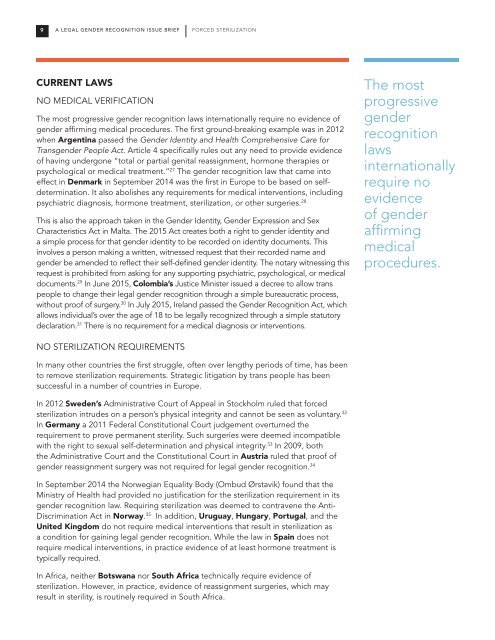FORCED STERILIZATION
lgr-forced-sterilization-20151120
lgr-forced-sterilization-20151120
You also want an ePaper? Increase the reach of your titles
YUMPU automatically turns print PDFs into web optimized ePapers that Google loves.
9<br />
A LEGAL GENDER RECOGNITION ISSUE BRIEF<br />
<strong>FORCED</strong> <strong>STERILIZATION</strong><br />
CURRENT LAWS<br />
NO MEDICAL VERIFICATION<br />
The most progressive gender recognition laws internationally require no evidence of<br />
gender affirming medical procedures. The first ground-breaking example was in 2012<br />
when Argentina passed the Gender Identity and Health Comprehensive Care for<br />
Transgender People Act. Article 4 specifically rules out any need to provide evidence<br />
of having undergone “total or partial genital reassignment, hormone therapies or<br />
psychological or medical treatment.” 27 The gender recognition law that came into<br />
effect in Denmark in September 2014 was the first in Europe to be based on selfdetermination.<br />
It also abolishes any requirements for medical interventions, including<br />
psychiatric diagnosis, hormone treatment, sterilization, or other surgeries. 28<br />
This is also the approach taken in the Gender Identity, Gender Expression and Sex<br />
Characteristics Act in Malta. The 2015 Act creates both a right to gender identity and<br />
a simple process for that gender identity to be recorded on identity documents. This<br />
involves a person making a written, witnessed request that their recorded name and<br />
gender be amended to reflect their self-defined gender identity. The notary witnessing this<br />
request is prohibited from asking for any supporting psychiatric, psychological, or medical<br />
documents. 29 In June 2015, Colombia’s Justice Minister issued a decree to allow trans<br />
people to change their legal gender recognition through a simple bureaucratic process,<br />
without proof of surgery. 30 In July 2015, Ireland passed the Gender Recognition Act, which<br />
allows individual’s over the age of 18 to be legally recognized through a simple statutory<br />
declaration. 31 There is no requirement for a medical diagnosis or interventions.<br />
The most<br />
progressive<br />
gender<br />
recognition<br />
laws<br />
internationally<br />
require no<br />
evidence<br />
of gender<br />
affirming<br />
medical<br />
procedures.<br />
NO <strong>STERILIZATION</strong> REQUIREMENTS<br />
In many other countries the first struggle, often over lengthy periods of time, has been<br />
to remove sterilization requirements. Strategic litigation by trans people has been<br />
successful in a number of countries in Europe.<br />
In 2012 Sweden’s Administrative Court of Appeal in Stockholm ruled that forced<br />
sterilization intrudes on a person’s physical integrity and cannot be seen as voluntary. 32<br />
In Germany a 2011 Federal Constitutional Court judgement overturned the<br />
requirement to prove permanent sterility. Such surgeries were deemed incompatible<br />
with the right to sexual self-determination and physical integrity. 33 In 2009, both<br />
the Administrative Court and the Constitutional Court in Austria ruled that proof of<br />
gender reassignment surgery was not required for legal gender recognition. 34<br />
In September 2014 the Norwegian Equality Body (Ombud Ørstavik) found that the<br />
Ministry of Health had provided no justification for the sterilization requirement in its<br />
gender recognition law. Requiring sterilization was deemed to contravene the Anti-<br />
Discrimination Act in Norway. 35 In addition, Uruguay, Hungary, Portugal, and the<br />
United Kingdom do not require medical interventions that result in sterilization as<br />
a condition for gaining legal gender recognition. While the law in Spain does not<br />
require medical interventions, in practice evidence of at least hormone treatment is<br />
typically required.<br />
In Africa, neither Botswana nor South Africa technically require evidence of<br />
sterilization. However, in practice, evidence of reassignment surgeries, which may<br />
result in sterility, is routinely required in South Africa.


